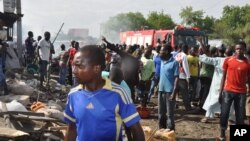The Boko Haram insurgency continues to expand in size and tactics, kidnapping villagers and forcing them to fight.
But what may appear to be mayhem in northeastern Nigeria, is actually a strategy to wrest territory from the Nigerian government by isolating the northern seat of power.
Forced to join Boko Haram
Boko Haram
Boko Haram
- Based in the northeastern city of Maiduguri
- Self-proclaimed leader is Abubakar Shekau
- Began in 2002 as a nonviolent Islamist splinter group
- Launched uprising in 2009
- Has killed tens of thousands since 2010
- Boko Haram translates to "Western education is sinful"
- Wants Nigeria to adopt strict Islamic law
Kidnapping is becoming more common as Boko Haram militants storm villages, taking men, women and children. Last week, nearly 100 victims were reportedly rescued from insurgents, but no one knows how many are still being held.
The victims are often forced to join Boko Haram, blurring the line between the attackers and those they attack.
“These young people out there in the forest [are] without hope now," said James Wuye, a pastor who counsels kidnap victims in northern Nigeria. "Their only hope is to die. We should save them. I think we should pity everybody on each side. This violence is affecting both the perceived victim and the aggressors.”
Kidnap victims are strengthening Boko Haram by growing their army, says Yan St. Pierre, the CEO of the Berlin-based security consulting firm MOSECON.
Gaining ground
Where once the group was just trying to survive, he says it is now trying to take over territories.
“Boko Haram is now planning strategically long-term," St. Pierre said. "It’s not about replenishing forces. It’s about acquiring more personnel.”
Boko Haram has killed thousands of people this year alone in a growing, five-year-old insurgency. The group -- which says it wants to enforce a harsh version of Islamic law -- is constantly morphing, and is increasingly well-armed and well-funded.
Brutal tactics
St. Pierre says the insurgents are using tactics pioneered by Joseph Kony in Uganda and Charles Taylor in Sierra Leone to gain loyalty from victims. He says kidnap victims, including children, are sometimes forced to kill people they know or love.
“By making them kill their own parents or their own family it makes them be in a position where they can’t go back," he said. "Psychologically they are absolutely broken. They killed their parents. They literally murdered what brought them to life. In that sense, their loyalty becomes to the only family that they have now, which is the army or the terrorist group that kidnapped them.”
He says Boko Haram also kidnaps girls and women, including the more than 200 schoolgirls abducted four months ago, to use as household help, sex slaves and most recently, bombers.
Last month, at least nine people were killed in four attacks by female suicide bombers. Two other girls were arrested, one was a 10 year old strapped with a bomb.
“They’re taking these little girls now and using them as weapons," St. Pierre said. "So it’s a double use by kidnapping girls.”
Circle of Power
In Borno and Adamawa states, two of the three Nigerian states that have been under emergency rule for more than a year, locals report that Boko Haram has taken over villages and towns, killing anyone who objects.
Analysts say the group's aim appears to be to create a circle of power around the Borno State government in the city of Maiduguri, with the goal of taking the state capital.
Nigeria previously said it has not, and will not, allow Boko Haram to rule any parts of Nigeria.
“The Nigerian military will not concede any portion of this country to terrorists or any such group,” said Major General Chris Olukolade, a defense spokesman.
However, a Boko Haram “takeover” may not be what it sounds like. If villagers are terrified into pledging loyalty to Boko Haram, the group can essentially control the area without hanging flags or building walls.
Ibrahima Yakubu contributed to this report from Kaduna.





